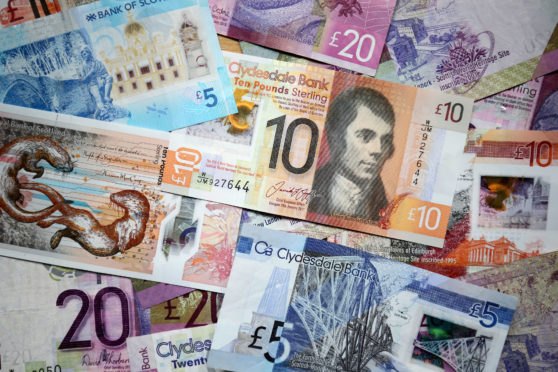
The SNP’s depute leader and Scotland’s Finance Secretary have called on their party to back their plan to win independence, including creating a new Scottish currency within five years of leaving the UK.
Delegates at the SNP’s spring conference in Edinburgh will vote on the proposal tabled by Keith Brown and Derek Mackay.
The pair said their three-part plan to grow the economy, build sustainable finances by rejecting austerity and have an SNP Government in an independent Scotland establish its own currency would help them win a second independence referendum.
The resolution to conference states Scotland would continue to use the pound in a transition period after leaving the UK while aiming for MSPs to vote on establishing a new Scottish currency by the end of the first term of an independent Parliament.
It comes as a new poll indicated more than 70% of people in Scotland want to keep the pound.
The proposed policy shift is a major change from the SNP’s stance ahead of the 2014 independence referendum, when then-first minister Alex Salmond said Scotland would continue to use the pound in a UK-wide currency union.
All the UK parties rejected this and uncertainty over currency was viewed as one of the reasons why Scots voted by 55% to 45% against leaving the UK.
Mr Brown called on delegates to back the resolution without amendments.
He said: “We recognise that to win that case we must convince more people than we reached in 2014.
“We need a strong, credible, and ambitious argument to take to the doorsteps – and our proposals provide just that.
“Growing Scotland’s economy, building sustainable finances through rejecting austerity outright and moving to an independent currency in a safe and secure way provides that winning plan.”
A Survation poll for campaign group Scotland in Union found 72% want to keep using the pound, while 12% want a new Scottish currency to replace it.
Fewer than one in 10 (7%) of the 1,012 adults surveyed online between April 18 and 23 want to use the euro instead of the pound, while 9% said they did not know.
The poll also found the most popular choice for respondents asked if the idea of Scotland having its own currency makes them more or less likely to back Scottish independence was that it did neither, at 44%.
Around one in four (39%) said they would be less likely and 11% said they would be more likely, with 6% telling researchers they did not know.
This is a marginal drop from the 40% who told a previous Survation poll for the campaign group they would be less likely to support an independent Scotland if a new currency was proposed.
Last month, 42% said changing Scotland’s currency would not affect the way they vote, while 12% said they would be more favourable of leaving the UK with a new currency.
A separate poll by pro-independence group Progress Scotland the same month found keeping the pound as the national currency for the long-term in an independent Scotland had the support of 47% of the 2,000-plus respondents.
Switching to a Scottish currency in the short-term was only favoured by 6%.
Scotland in Union chief executive Pamela Nash said: “The overwhelming majority of people in Scotland want to keep the pound and don’t want a new currency.
“By remaining in the UK we can keep our pound, protect mortgages, pensions and salaries, grow our economy without extra red tape for businesses and use a stable currency backed by the strength of the UK’s central bank and 30 million taxpayers.
“The SNP should drop its unwanted plan for a divisive second independence referendum and its hated plan to scrap the pound and get on with the day job of running our hospitals, schools and trains.”
Scottish Conservative finance spokesman Murdo Fraser said: “The Yes campaign messed up the approach on currency last time around and it cost them dearly.
“And this study shows the SNP is still no closer to sorting the issue out.”

Enjoy the convenience of having The Sunday Post delivered as a digital ePaper straight to your smartphone, tablet or computer.
Subscribe for only £5.49 a month and enjoy all the benefits of the printed paper as a digital replica.
Subscribe